One year of travel!
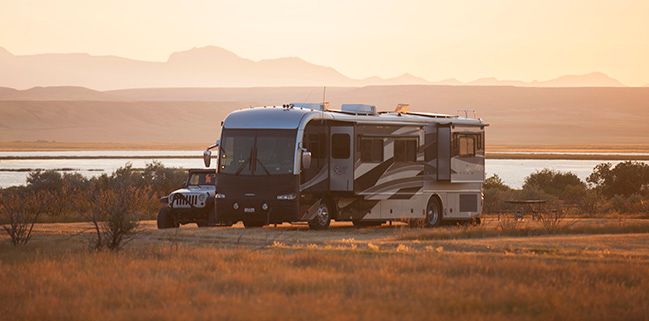
As part of celebrating one year of travel, we solicited questions from our followers on Instagram & Facebook. Before we get to that though, let’s bring you up to date with where we left off 6 months ago!
Time 6 months (Aug 1, 2017–Jan 31 2018, 183 days)
Driven 3,239 miles
Visited 1 new state (Colorado) & came back through many we had hit in the first 6 months
Total paid for RV parking: $1,740.23
Paid camping: 71 days plus 33 days at LTVA (of 183)
Percentage of paid nights: 39% paid plus 18% at LTVA
Average nightly cost of paid camping: $21.98 for non-LTVA nights, $16.73 with LTVA included
Average nightly cost: $9.51
LTVA is the Long-Term Visitor Area in the BLM Yuma field office area. $180 gets you a whole season of access to the land (no 14-day limit!), dump stations, water, and trash. We will continue getting value of that past this six-month milestone, putting our expected costs for our LTVA stay this winter season at $3.33/night.
Miles driven 3,239
Diesel pumped 409.619gal, paid $1,117.67
Average price per gallon $2.728/gal
Rough average consumption 7.90mpg
The mpg number is a very rough guesstimate because diesel pumped doesn’t mean diesel burned — our tank is at more than half now, if it was near empty in August, that’s easily 60 gallons extra pumped that we haven’t burned yet! Some of the diesel has also been consumed by the generator, though we don’t run the generator much. Either way, it’s unlikely to be much above 9 mpg, ever.
Our diesel tank is huge. We could get fuel just once every two months while exploring the US from border to border, and drive more than 1,000 miles on a single tank.
Overall, we are really happy with these numbers, as they are a great improvement from our first six months and we think we can do even better by continuing to boondock as much as possible!
Tourism
-
National Parks & Monuments visited:
- Petrified Forest National Park
- Grand Canyon National Park (2 week stay within the park)
- Kasha-Katuwe Tent Rocks National Monument
-
Other notable parks and events
- Kofa National Wildlife Refuge
- Solar eclipse in Wyoming
- Xscapers Annual Bash in AZ & CA
Life Events
- Said goodbye to Stimpy
- Said hello to Mushy
- Celebrated our 1 year nomadiversary (today! January 31st, 2018!)
- Ane’s custom pet portrait paintings have been a hit, see http://probablyagooddog.com/
Questions & Answers
And now let’s get to the Q&A! Some questions have been combined since they were similar to others. Ok let’s begin!
What do you miss (if anything) about having a permanent residence?
Ane: The benefits to being nomadic definitely outweigh the negatives for me, but there are things I miss about having a “sticks and bricks” home. The creature comforts I miss are baths, long showers, having a regular size washer/dryer in our home (we have a combo unit in our RV but rarely use it since we boondock a lot and try to conserve resources). It also takes almost 3 hours to wash and dry a small load of laundry.
I also really miss going to group exercise classes several times a week. I’m exercising while on the road, by running, skating (when I can find pavement) and doing my own workouts with dumbbells, hiking, etc, but it’s just not the same intensity/hours as I was putting in before. Some people love biking - we don’t have bikes with us, but I could see how that would be a great workout while on the road.
But since we can move our home to locations like this...
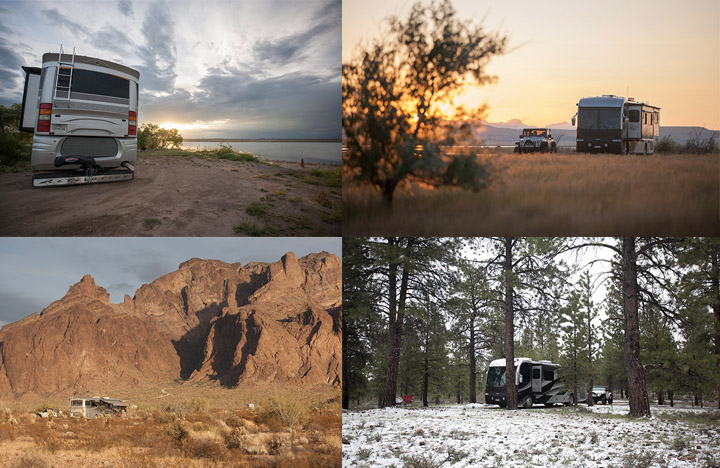
...the tradeoffs are worth it!
Tommi: I sometimes miss the ergonomic office chair, huge sit/stand desk, and ample space for projects and gadgets I had in my home office. I miss easy access to a wide variety of amazing ethnic foods.
Is it actually more freeing? Do you ever feel “homeless”?
Ane: Yes, it’s definitely more freeing! We can go wherever we want, and bring our dogs along, which we love! We have a Google "My Maps" with pins of all the things that interest us across the US. It’s been really fun to explore and plan out our travels! We don’t feel homeless because our home is constantly with us. And yes, even though it’s an RV it feels like a home!
Tommi: A big part of the RV lifestyle is building your life in a way that is more flexible. Our running joke is that I can’t remember what day of the week it is, and neither one of us can remember where we camped two weeks ago. Life is more about the here and now, and that encourages a certain mindfulness of what your life actually consists of. It’s hard to split that into how much of it is about travel, how much about living in the nature, how much about spending time with dogs, and how much about escaping the hamster wheel of a desk job. Totaled together, this is amazing, as long as finances work out.

They say petting dogs is relaxing. 😂
What did you do to prepare for a year long trip? How did you come up with a budget? Were you able to stick to that budget, if there was one?
Ane: To prepare, we made a rough plan of where we wanted to go that year. What we didn’t do was check average temperatures for those areas of the country. What we learned is that we headed North too soon. It was still below freezing at night when we got to Utah so we spent a few days in April with snow on the ground (something we did not want to do). Now, we know to really check average temperatures in each area so we are there at a comfortable time.
For budget, we knew the first year would be expensive since we had repairs and upgrades we wanted to do (such as install solar panels and new batteries, buy a towed vehicle, etc) so we just went into it knowing we’d be spending a lot in the beginning to get set up. We agreed on some rough numbers for things like the tow vehicle, solar, etc but didn’t agree to a monthly budget since we really didn’t know what to expect. We also didn’t have our solar setup for the first 2 months, so we were forced to pay for hookups each night. Now that (hopefully) all the big expenses are out of the way, we are much leaner on expenses. RV parks, diesel and maintenance are our biggest RV-related expenses at this point, but those can be lowered by boondocking more and traveling at a slower pace.
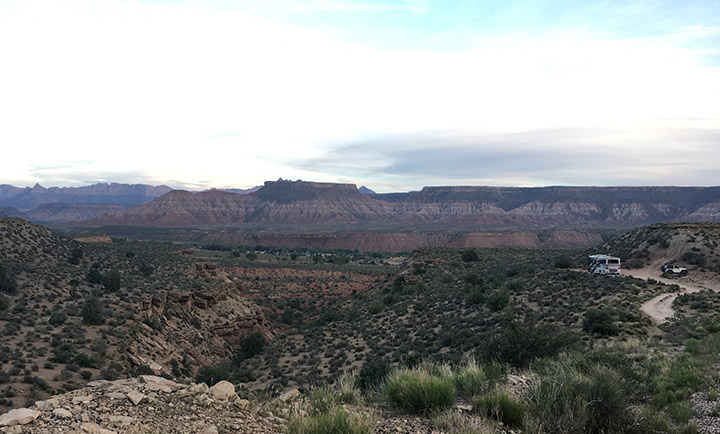
Can you believe this is a free camping spot? (do you see us?)
Tommi: Our travels were always meant to be “until further notice”, not for a year. We put in way too much money in initial costs to travel just a year. As for budgeting, I’ve honestly never had a monthly budget in my life, for anything. Years of entrepreneurial life has made me get very uncomfortable if I don’t have enough of a rainy day fund, and I’ve been pretty thrifty through my whole life, so as long as the rough ballpark numbers worked out, I was fine with just seeing what happens. I am, though, keeping careful track of our expenses, and trying to never buy the wrong things, and not waste money. Ultimately, we may get hit with thousands of dollars of urgently needed repairs at any moment, so any financial plan has to be more about long term averages than individual months.
If you are willing, what’s your budget like compared to before RV life?
Ane: I was making a very comfortable living in San Francisco, but our expenses were the highest they’ve ever been! To give you an idea, what we spent on paid camping in our first 6 months on the road was cheaper than our rent for one month in San Francisco.
So although I am making less money working freelance (and painting pet portraits) our regular expenses are drastically less. We did have a lot of set up costs (buying the RV, buying the tow vehicle, solar & battery purchase and install, etc) but now that those things are out of the way we don’t expect to have any other major expenses, except for regular maintenance on the vehicles. I’m also not buying a $5 drink at Starbucks every day and we’re not going out to eat as much. I also very rarely buy clothes. In an upcoming blog post, I’d like to track what we spend in a month and share it with everyone!
Tommi: I’ve worked as a software developer, manager, and sometimes business owner in the tech industry for over two decades. I don’t earn nearly as much as I used to, and I prefer it that way. Long ago, a friend described himself as a “programmer hobo”, and that’s appealing to me more and more, lately. This life is much better.
How do you plan your course? And how far in advance do you plan it? And do you have a strict schedule?
Ane: Our first 6 months of RV life had a lot of appointments to get to by a certain date. That’s not a super fun way to travel because you feel stressed about making your deadline and are just focused on arriving in time. We were doing a lot of back-to-back travel days and traveled in some bad weather.
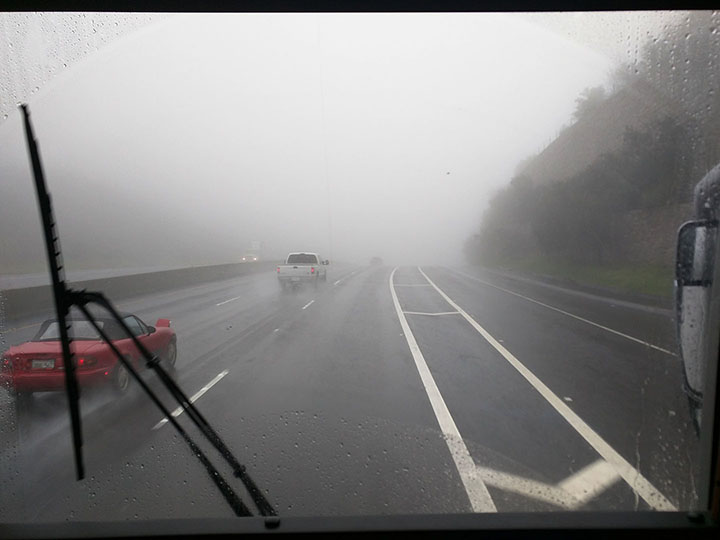
Now that those appointments are taken care of, we are traveling at a more relaxed pace. We just agreed on a rough plan for 2018 and we generally get down to details 1-2 months ahead of time. For example, today is Jan 31st and we know where we are going to be between now and the end of March. If we need reservations, we have them booked. The only caveat to that is if you want to stay in a campground in or around a National Park, or popular city. Since our RV is 38’, we can’t fit most campsites within Glacier National Park so we just made a reservation at a park outside the west entrance for mid-July. We don’t like to have to plan that far ahead of time, and it does put a deadline on our calendar to be in Montana by then, but it’s something we really wanted to do so it’s worth the trade off. Most RV parks will have some sort of flexible cancellation policy. For example, if we cancel up to 10 days ahead of check-in, we only lose $30. Better to have the reservation than not.
In terms of schedule, we’ve found that moving every 7-14 days works best for us.
Tommi: In general, I know 2-3 weeks out what route we’ll be driving, reserve "non-destination" layover RV parks 4-5 days ahead of time, and when we’re boondocking or going to a non-reservation campground, I’ll have a few backup plans prepped a few days ahead of time, typically falling back to a nearby overnight-friendly Walmart or rest area as the worst case scenario. Two days before travel I will have looked at satellite and street views of the relevant places, and I try to have the GPS all set up at least a day ahead of time. It’s pretty typical that a day or two before we’re “scheduled to” leave, we decide to stay for an extra week or so. The less we tie these plans to dates on a calendar the happier we are. Think of it more like an hourglass that can be reset, and we leave when the sand runs out. Except instead of an hourglass, it’s our holding tanks.
How long do you drive the RV on average per day?
Ane: We usually stay in one location 7-14 days. On our driving days, we tend to follow the 2/2/2 rule. Drive under 200 miles, arrive by 2pm, and stay at least 2 nights. That allows you to set up your RV in the daylight, and be well rested. Driving a 38 foot RV with a vehicle in tow is definitely more draining on you than driving a regular car.
What major item did you bring, that, in retrospect, you really did not need?
Ane: So, we brought our tent. It’s like a 4 person tent that stores in a rectangular carrying case. From the start, Tommi didn’t want to bring it because of the amount of room it takes up in our storage bays. I thought it would be nice to have if anyone came to visit us and didn’t want to sleep on the floor of the RV, so it came with us. The tent has traveled to 10 states and not been used once. I told Tommi to give it a year to see if we use it. Sadly, I think the tent’s time might be up!
Tommi: I brought a big “tower” desktop computer, because I couldn’t sell it at a good price. It’s a power hog and takes up way too much space, and I have to stow the monitor every time we travel. However, it’s so much beefier than a laptop that I enjoy using it, even if I wish it wasn’t here.
I also have a very complicated relationship with a big pile of books that are hard to have in an RV.
How has being on the road affected your diet? Have you experienced food challenges when living on the road. Do you find it hard to keep up with how you’d like to eat when your access to fresh food and restaurant options is limited?

Ane: Having most recently lived in Los Angeles and San Francisco, we were accustomed to eating out a lot. We were also used to very good, fresh produce. Since being on the road, we mostly cook at home. We do that to save money, but also because we don’t often travel to big cities, and the dining options we’ve come across in small towns just haven’t been that great, especially for vegetarians. 2017 also goes down as the year I had the worst pad thai and worst pizza known to man. We’ve also found fresh produce can be hard to come by. Walmart actually has consistent produce, so we do a lot of our shopping there. We shopped for food about once a week before, that hasn’t really changed much, except for that now we sometimes take our home to the grocery store!

In the last year, there was really only one location so remote that we basically couldn’t find (affordable) fresh fruit or vegetables. That was when we were staying outside of Bryce Canyon National Park. We were in the Dixie National Forest, and the closest grocery store was in Panguitch, Utah. It was a small store. They had the basics for whatever you might need, but the fresh offerings were in bad shape. The nearest Walmart was an hour and thirty minute drive and our other option was a high priced gift shop right outside the national park. We purchased some frozen and canned veggies from the small grocery store in Panguitch to get us by for the few weeks we were there. Another veggie RVer suggested that when you come into a small town, stop in the grocery store and ask them what day they get their produce delivery. We will definitely be doing that!
Are you comfortable pooping in an RV or do you prefer to stop somewhere?
Ane: You’ll find RV’ers talk a lot about poop, so I have no issues with answering your question! We definitely prefer to poop in our RV as opposed to stopping somewhere, but the part I had to get over really quick was that RV walls and doors are very thin, so there’s really no privacy from your travel partner when it comes to bathroom noises! We usually refer to the bathroom as “the office,” so when one of us needs to go we usually tell the other “I’ll be in my office” and that says it all!
Bonus TMI: I’ve peed outside in nature more times this year than in my entire adult life!
Tommi: Who doesn’t prefer pooping (and showering) at home? Our home just happens to be on wheels. Usually, you hear campground vault toilet and truck stop shower stories from people who are trying very hard to make their tanks last as long as possible, and we have big enough holding tanks to make that not be much of an issue.
And yes, about once a week I get to watch our poop flow down a sewer hose with a see-thru section, and you have to pay at least some attention because you need to know your tanks are getting emptied properly. The alternative is worse…
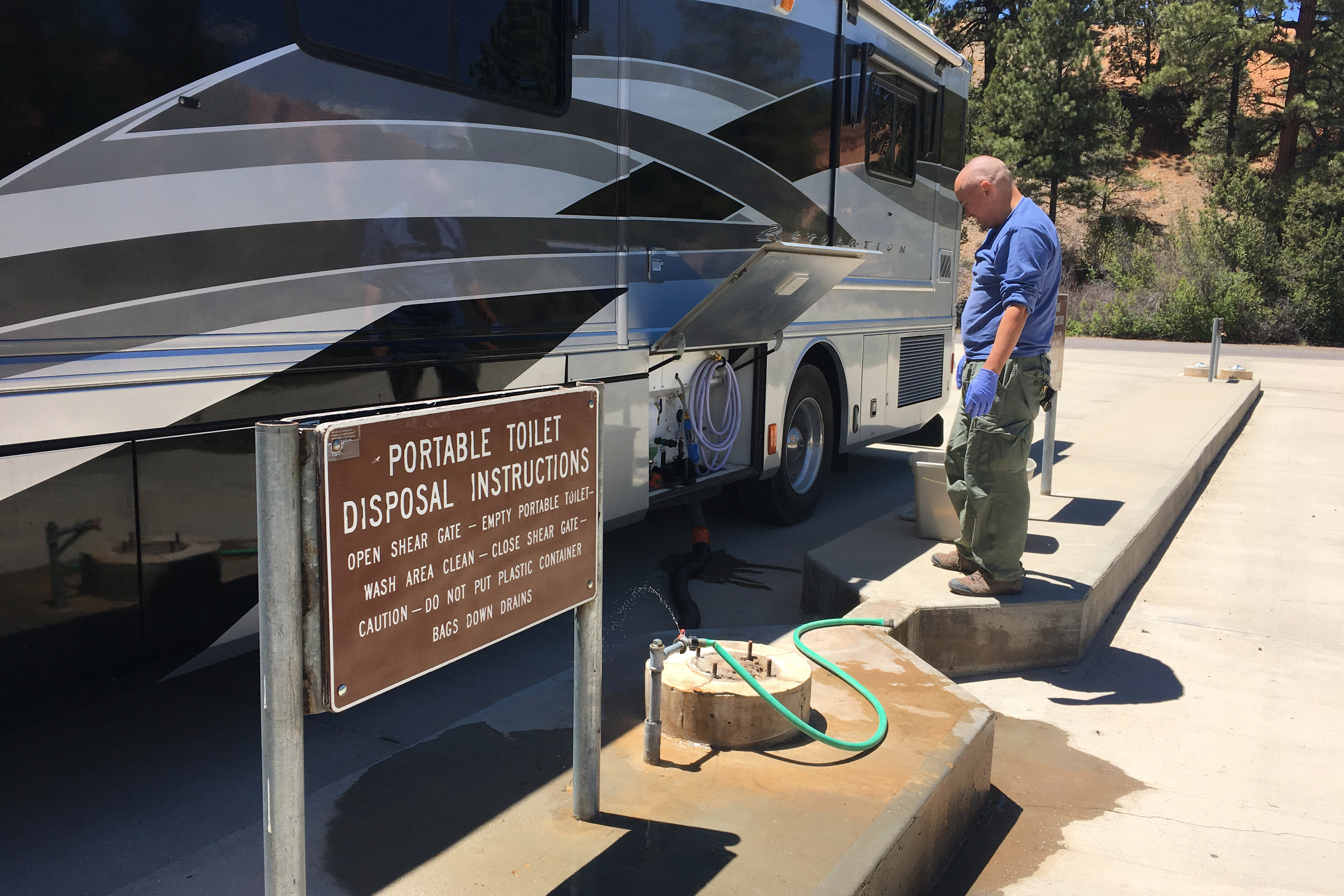
What's your favorite RV park?
Ane: We prefer to boondock (stay for free on public lands) instead of staying at an RV park. RV parks cost money, are usually cramped and sometimes aren’t very dog-friendly. Boondocking allows us to save money, be in very scenic & remote locations, and the dogs can usually roam off leash.
Tommi: Small town RV parks are a total crap shoot, but sometimes they’re great. We really enjoyed an RV park in Kanarraville, Utah, a town so small it doesn’t have a single retail shop of any kind. We’ve only been to a total of 47 RV parks and paid campgrounds so far, so we’re not experts, and never intended to “look for the best RV park”. RV parks are where we go to dump tanks, get water, and run air conditioning on hot days — or when we need a guaranteed spot after a long day of travel. Outside of that, I’d rather be boondocking.
I’m curious how you both go to great remote spots and stay connected enough to work?
Tommi: We have an AT&T unlimited car plan that you can’t get anymore, and Verizon Unlimited phones that we can also tether to get online that way. There are places where data gets very very slow, but most of the time phone calls have been fine. The real game changer is a good cell signal booster, and a well-positioned antenna. I’m still in the process of figuring out a permanent ladder mount antenna.
If we see reviews say a campsite has really poor cellular connectivity, we just don’t go there. The biggest exception is national parks we really wanted to see, for example, Grand Tetons made us walk to the laundromat/grocery store for wifi, and at Grand Canyon we’d go to the hotel/grocery store and use their wifi.
Ane: Overall, because Tommi does a lot of research before we go to a new destination, we haven’t had connectivity issues. The site campendium.com lets users review campsites and report how strong their wireless signal was. We’ve found that to be very helpful. In the last year, we only had to leave one sightseeing location early — Kodachrome Basin State Park. We had absolutely no signal and I needed to be available via e-mail that day so we did a quick visit and left.
Can the dogs stay in the RV if there’s something you want to do that they aren’t allowed at? Does it get too hot or cold for them?
Ane: We like to include the dogs in as much as we can. That was a huge reason we were attracted to the RV lifestyle. Generally, we only leave them inside by themselves if we know the temps will be okay and it’s a short period of time. Windows open, both ceiling fans running, a yummy snack, radio on and they’re good. If we know it’s going to be hot, we’ll find a campsite to plug into so we can run our AC, or we’d look into boarding them (a lot of the National Parks have nearby, or park run kennels).
Tommi: I have tiny $5 computer with a camera and temperature sensor, and the skills to set it all up, but it’s not done yet. When we lived in a house, I had an old phone propped up in front of Lily’s crate with a “surveillance camera” app, but that setup was always a bit too fiddly.
We can also leave the AC set to turn on if the temperature climbs too high, our batteries will run the AC for a few hours, and finally, the generator will start when the batteries get too low. But that’s a bit awkward because if you don’t need the AC, you’d want to leave windows open, and with AC you’d want windows closed.
We really don’t leave the dogs alone much. On hot days, even less so. When we know well ahead that we need to do that, we plan to be in an RV park, plugged into their electricity for running the AC, with our batteries working as backup in case of a blackout — in that scenario, we’re actually more sure our dogs will be comfortable than people who live in normal homes!
What keeps you feeling safe?
Ane: DOGS! Our pups are the sweetest but have fierce barks, so I don’t worry too much about anyone trying to break into the RV if the dogs are home. They will also let us know if someone is approaching the RV. (We actually call Mushy's bark a "scream bark." It's awful and I can't imagine anyone wanting to come near us if he's scream barking!) Some RVers travel with firearms, but we don’t want to do that.
Tommi: There’s a big can of bear spray right by the door. It’s basically the same stuff as mace, just much, much, more potent, and sort of illegal to use for anything but extreme self-defense. Don’t mess with me.
Stories of things being stolen at a campground are relatively common, maybe comparable to house break-ins in cities. Stories of the actual RV being broken into are much more rare, but of course it could happen. Stories of RVs in the boondocks being stolen from are also much more rare. We can go for a week without seeing more than the same few RV neighbors and half a dozen ATVs driving by. It’s not likely a meth head will wander around in a national forest, there’s easier things for them to steal — like stuff in the rundown RV park or campground, near where they buy their meth from. And most RVs just don’t have that much good stuff in them, after all we value traveling light, and even our televisions are bolted in.
We do need to get better about backing up our laptops to somewhere outside of the RV, in case of fires or very thorough burglaries.
How do you adjust to being together ALL the time? How do you get time to yourselves?
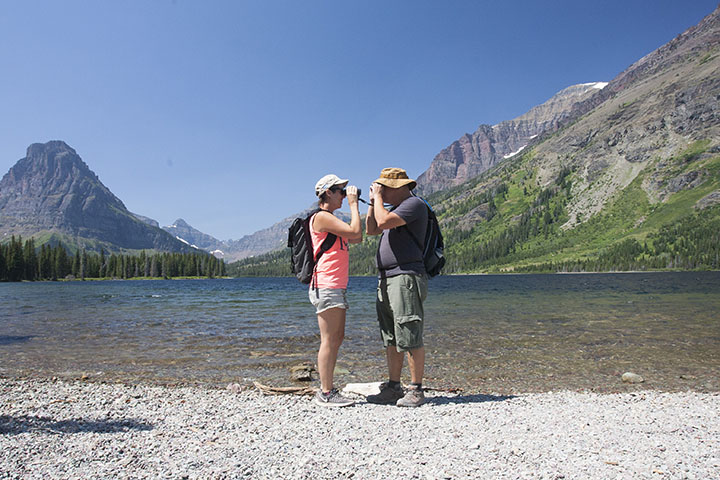
Are we sick of looking at each other yet?
Ane: That was a concern of mine from the start! Before deciding to do this, I asked Tommi if he had thought about that. I had an 8 hour work day and with my commute was generally gone for 11 hours M-F and spent hours each week on top of that at roller derby practice. Now, we’re together ALL THE TIME. We both have our own separate workstations so that gives us enough space during the day. We actually do most things together, but if we need time apart there’s headphones to wear, errands to run, or a workout to be done outside.
Tommi: Some RVing couples really recommend “planning to have time apart”, however that works out for you. So far, I think we’ve managed to just organically have enough of that. We typically need to drive half an hour per direction to get anywhere, so even running errands counts as significant alone time. It probably also helps that even when we’re physically close all day long, we don’t necessarily interact all the time. You really can’t keep much secret or private in a small space like this, so if the survival of your relationship hinges on that, you may not want to live in an RV.
Now that you have a year's worth of experience - What's the hardest and easiest parts of RV life?
Ane: I’d say the hardest part is that there’s never-ending to-do list of things that need repairing. Someone once said that when you have an RV, your “home” essentially goes through an earthquake every time you drive it down the road! When you look at it that way, it makes sense that things need repairing. We’ve driven down so many washboard dirt roads that our toaster had repeatedly jumped off the countertop (RIP toaster) and Tommi’s computer tower started unscrewing itself!
Easiest part? No commute to work!
Tommi: The continual repair and to-do lists are definitely a burden. It’s a really alien experience to realize that screws can work themselves loose in a month or two — Ikea wouldn’t survive long in this world. I think even harder than the repairs has been the onslaught of new things to learn. The weirdest thing has really been that I had no idea of the kinds of things I’d learn. I’m optimistic that the constant need to learn new things just to survive will slowly subside.
The easiest part of RV life I think, for us and our motorhome, has been how little the basic routines of our lives have really changed just because we live in an RV. We have ample space to live, a good kitchen, comfortable recliners, mostly working wifi, and a shower stall that could believably be found in a house — except ours has a skylight!
Your most and least favorite experiences and moments so far?
Ane: My favorite experience from this past year was definitely being in 100% totality for the solar eclipse! We made our way to Jay Em, Wyoming, looked at Google maps satellite view, and noticed there were roads along farm properties that were pretty far off the beaten path that likely wouldn’t have too many other people on them. We were right! We did a day trip with the Jeep...
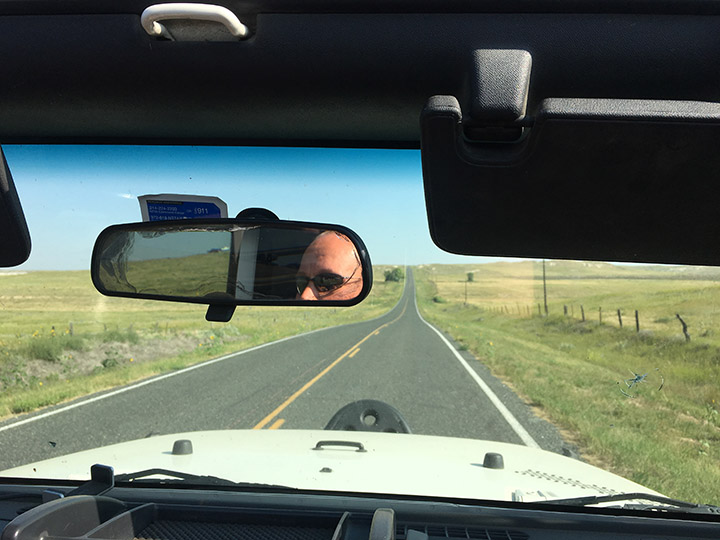
set up our chairs...
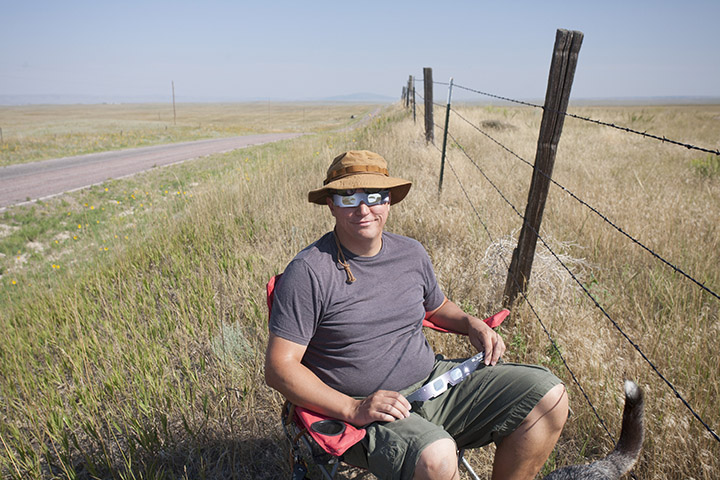
and had our own private viewing of the eclipse. Very otherworldly and I’m so happy that RV life allowed us the freedom to go exactly where we wanted to, without having to pay crazy hotel rates!
My least favorite experience this year was arriving to the Grand Canyon and getting a massive toothache on day two of our fourteen-day stay! The nearest dentist was one hour and 30 minutes away in Flagstaff, Arizona so I decided to tough it out until our reservation ended. I wound up having an abscess and needed a root canal. From start to finish it was done at 3 different dentists and cost a lot of money because I didn’t have dental insurance in 2017 (you bet I do for 2018!) So long story short, being sick on the road isn’t fun.
Tommi: I think my favorite moment was in Utah when Lily learned that she actually enjoys playing in cold mountain streams on a hot day. Before that, she had hated water and jumped over the streams to avoid them. It was nice to see her just open up to the adventure side of this life.
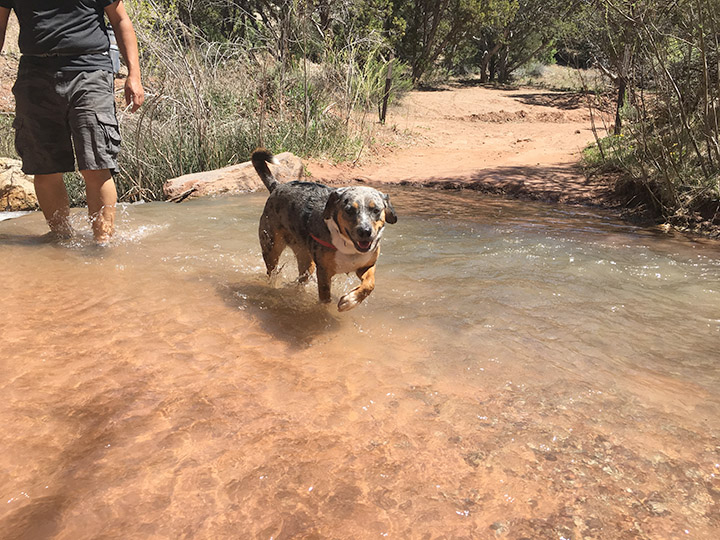
See the cute video here!
I think my singular least favorite moment so far was way back when we were still stationary in San Francisco when water started dripping out of a ceiling speaker.
Do you ever want to bow wow wow out of RV life? 😛 Is this now a permanent lifestyle change or a still an unknown temporary lifestyle choice?
Ane: Not yet! I don’t think either of us have had any moments of “oh what have we done…” So far it’s been a really positive, fun experience. It’s also been neat to see how our new family member Mushy has adapted to RV life. The first time the RV moved he was scared. You could also tell he was confused when we got to a new location. Now, he’s the first one wanting to get out of the RV and sniff his new backyard!
I actually think you’re going to see more and more young people adopting this way of life because of how easy it has become to stay connected for work on the road.
Tommi: This is as much permanent as anything has ever been for me. “Permanent for now.”
What RV fail has taught you the most?
Ane: I gave myself a heart attack one day when we were leaving a campground. We weren’t going that far so I didn’t do my normal ritual of locking the RV door. I had both dogs with me, while Tommi was driving the Jeep. Lily was on the passenger seat and Stimpy was in his command post right next to me. I turned my first corner onto a larger road and THE RV DOOR SWUNG OPEN! I guess I didn’t shut it hard enough and the force of the turn opened it. Lily jumped off the seat and stood at the now wide open door as I’m trying to grab her, yell at her to STAY!!! and bring the RV to a stop. Now, no matter how short the distance, I always lock the door!
Tommi: We’ve driven into a couple of places only to realize we’re too big to fit. We’ve been very close to having to reverse into traffic to get out — an even bigger deal when you know we can’t reverse without first unhooking the jeep.
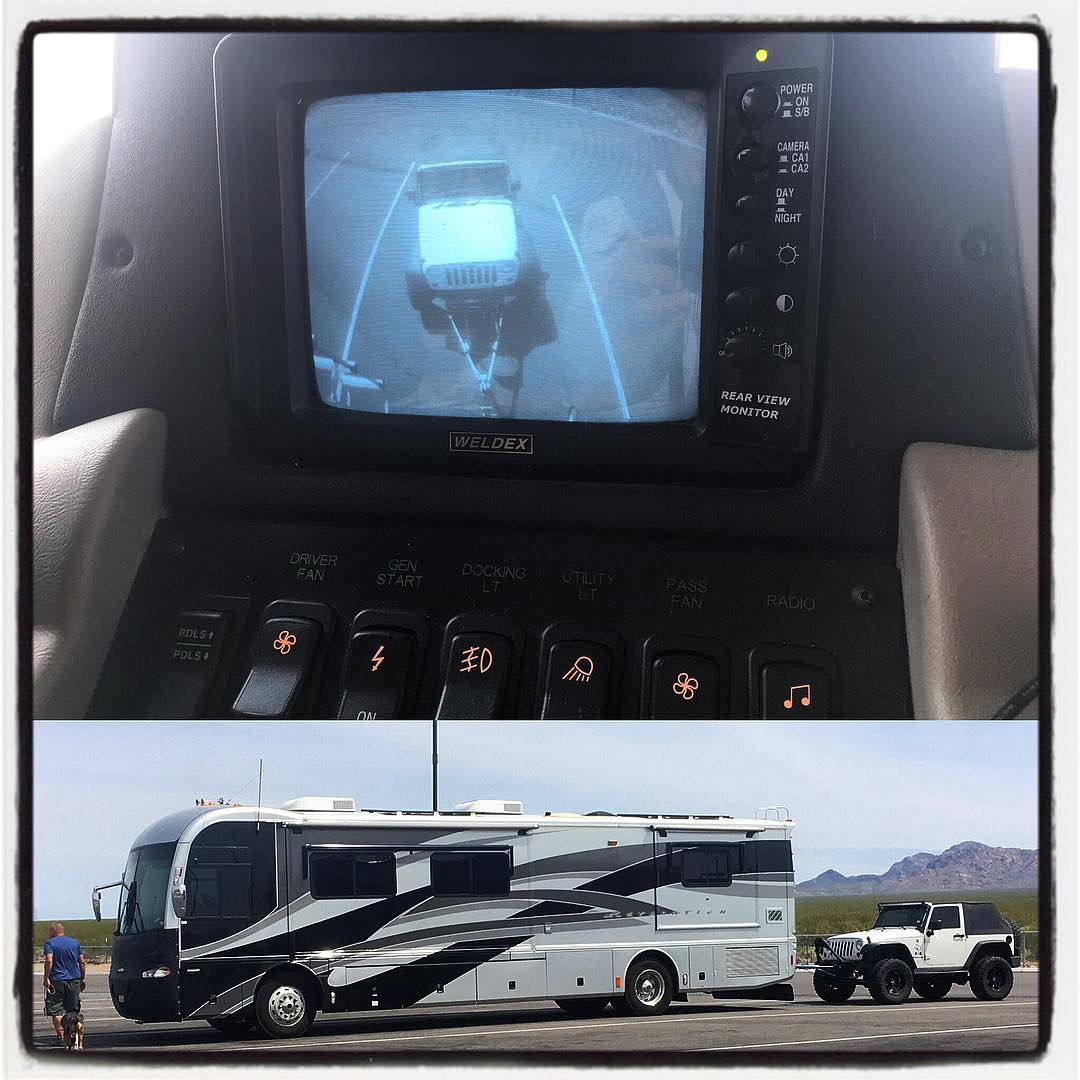
I have jumped out plenty of times with a walkie-talkie to make sure we can make a turn without wrecking parked cars. We’re now pretty paranoid about where this big rig goes, and try to never enter a parking lot without having seen a separate drive-thru exit route in a satellite view. Consequences of making a wrong turn can be pretty dire when you’re 55+ feet in combined length, and tall enough to hit tree branches.
(Honorary mention: that time when we were towing the jeep and its front wheels didn’t straighten after a turn, and I had to jump out and panic unhook and drive it away while semis sat waiting behind us in traffic. The jeep steering has been fixed since.)
What is the most embarrassing thing that has happened due to your lack of privacy in the RV!?
Ane: All of our windows, except the windshield and the kitchen, have a one-way tint on them, so we can see out but others can’t see in…well, unless you have a light on inside. I tend to just change in the bedroom without pulling the shades. I’ve probably given neighbors a show at some point!
Tommi: The bathroom door doesn’t leave much to imagination.
I was surprised to read many RV parks exclude RVs that are more than 10 years old. Are there many safe places to park for those with older RVs?
Ane: We have a 2004 Fleetwood Revolution, so we are subject to that rule if a park has it. We were concerned about that but have not found it to be an issue at all for us. The first time we encountered it was while we were stationary, living in an RV park outside of San Francisco. For any rig older than 10 years, they required a photo. Luckily, our RV was in really good condition so they approved us. Other than that, we haven’t stayed at any parks with that rule. We’ve found that it’s really the upscale, expensive “RV Resorts” that tend to impose that rule. Since those are expensive places to stay, we avoid them anyway, so it works out just fine for us. This was another reason we invested in our solar power system. We can stay on public lands, and not worry about conforming to private RV park rules. We usually feel very safe when parking out in the “boonies.” If we get a weird vibe, we move.
Tommi: That rule is generally enforced very selectively, to weed out motorhomes that look like they’ll break down during their stay there, and the people associated with that world. Having a “nice” rig sure helps, age is not the real criteria.
On your adventures, what was something that was hard to see, and did it change you in any way?
Ane: Before hitting the road, we both spent a lot of our time in big cities. Now, in our RV we are in small cities, “off the beaten path”. I was surprised at how economically depressed so many of the small towns with low populations have been. Cute main streets have many empty storefronts, and some look like they might have been bustling towns and are now run down. You hear about it, but it was different to see it in person.
Our travels also took us through many Native American Reservations, which often showed signs of the same economic struggle on top of everything we as a country have done to their people. Seeing it first hand is definitely different than reading about it.
Tommi: It’s crazy to see just how strongly coal, oil, mining and such rule some small towns. It’s uncomfortable to think that small towns can have tap water they shouldn’t drink. It’s scary to hear some of the political opinions out there.
Where to next
Our travel plan for 2018 is to do the things in the West that we missed in 2017. For example, we loved Western Utah, but didn’t make it to Moab. This year, we will! We also ran out of time last summer to see Washington and Oregon so the PNW is high on our list for 2018.
We will continue to primarily boondock, as that is our favorite and least expensive way of living, is usually very quiet and beautiful, and of course dog-friendly. Because…
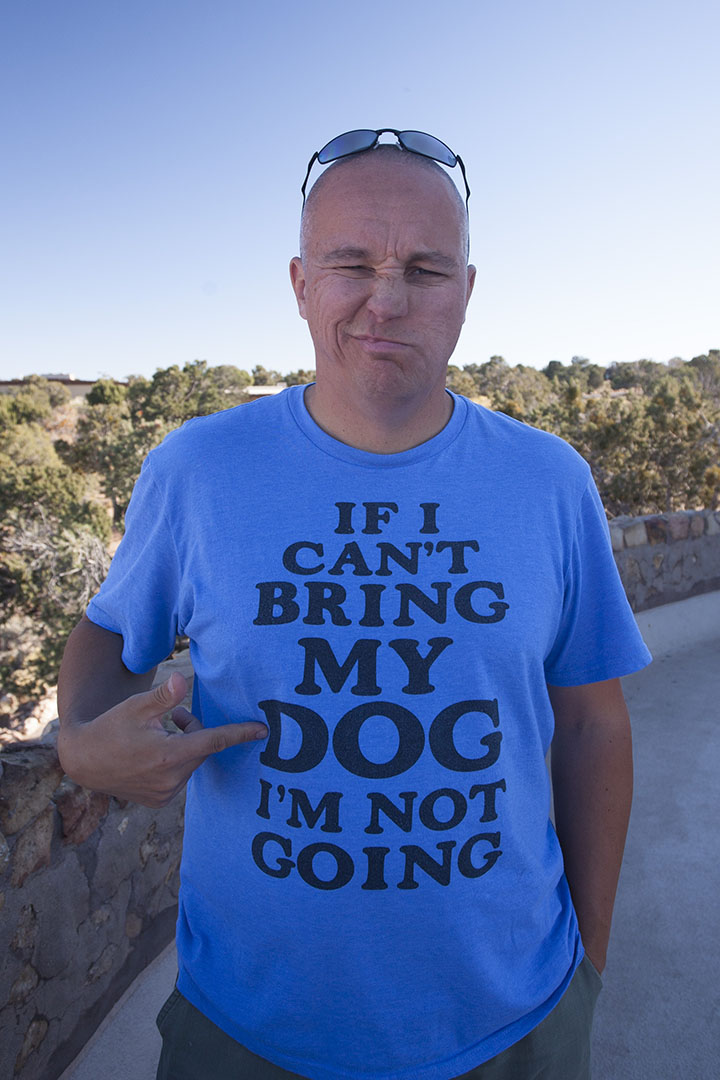
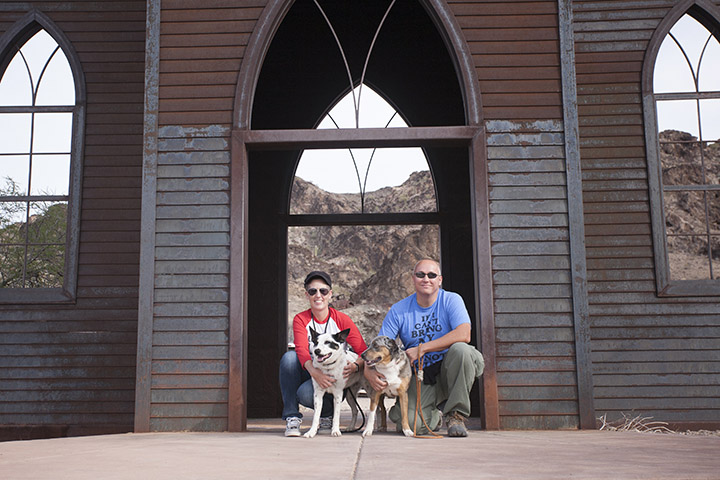
photo credit: Sara Sheehy
